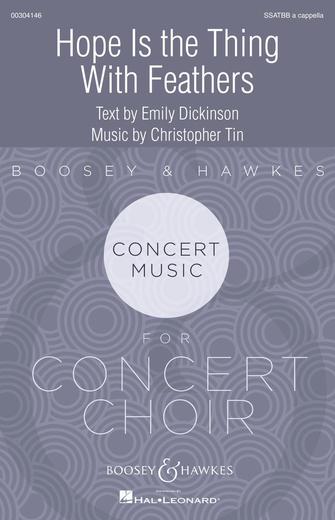In Celebration of the Human Voice - The Essential Musical Instrument
Home | Doo Wop | Barbershop | World | Contemporary | Christian | Vocal Jazz | Choral | Christmas | Instructional | Arrangements
Classical | Opera | Musicals | Personality | Young Singers | Disney | Videos | Songs | The Artists

Christopher Tin

Christopher Tin is a two-time Grammy-winning composer. His music has been performed and premiered in many of the world's most prestigious venues--Carnegie Hall, Lincoln Center, and the United Nations--and by ensembles diverse as the Royal Philharmonic Orchestra, Metropole Orkest, and US Air Force Band. His song "Baba Yetu", originally written for the video game Civilization IV, holds the distinction of being the first piece of music written for a video game ever to win a Grammy Award. He is signed to an exclusive record deal with Universal under their legendary Decca label, published by Concord and Boosey & Hawkes, and is a Yamaha Artist. He works out of his own custom-built studio in Santa Monica, CA. |
Christopher Tin : The Lost Birds (An Extinction Elegy) The Lost Birds is a musical memorial to bird species driven to extinction by humankind. Sweeping and elegaic, it's a haunting tribute to those soaring flocks that once filled our skies, but whose songs have since been silenced. It's a celebration of their feathered beauty: their symbolism as messengers of hope, peace, and renewal. But it's also a warning about our own tenuous existence on the planet: that the fate that befell those once soaring flocks foreshadows our own extinction. Songlist: Intermezzo, There Will Come Soft Rains, Flocks A Mile Wide, Bird Raptures, A Hundred Thousand Birds, Thus In The Winter, In the End |
Displaying 1-12 of 12 items.
With a simple melody inspired by children's songs, All That Could Never Be Said is a setting of Sara Teasdale's poem In the End. Showcasing her signature pairing of nihilism and pastoral beauty, the poem is an exploration of regret: it suggests that the consequences of our inaction are final and absolute. There are no second chances to speak up or to act, and all our missed opportunities will be lost to us until we're reunited with them in death.
Composer: Sara Teasdale | Poetry By: Sara Teasdale
To Shiver the Sky is an oratorio about the history of flight, and mankind's quest to conquer the heavens. Told through the words of 11 of our greatest astronomers, inventors, visionaries and pilots, it charts our relentless need to explore the universe, defy our earthly bonds, reach for the face of God, and ultimately claim our place among the stars. It is sung in English, Latin, Italian, German, French, Polish, Russian, and Sanskrit. This is the fifth movement of the work entitled, Astronomy.
Translated from the words of the Lord's Prayer. this Grammy-winning 2005 composition from the fourth entry in the award-winning video game franchise Civilization is a watershed moment in video game composition. Becoming the first piece of video game music to ever be even nominated for a Grammy, this epic piece is presented for the first time at Hal Leonard. The Closer Look pane on this product page contains pronunciation guides and an introduction to the language of Swahili by linguist and Kiswahili expert Peter M. Mhunzi.
Performed By: Soweto Gospel Choir
Translated from the words of the Lord's Prayer, this Grammy-winning 2005 composition from the fourth entry in the award-winning video game franchise Civilization is a watershed moment in video game composition.
Arranger: Roger Emerson
Emily Dickinson's poem on the fragility of nature, as well as our own hand in its destruction, finds a elegiac tone in this original piece from Baba Yetu composer Christopher Tin. Palo Alto High School, Tin's alma mater, commissioned this deeply melodic composition in celebration of their centennial in 2018.
Poetry By: Emily Dickinson
Iza Ngomso is the fourth movement of Christopher Tin's major work The Drop That Contained the Sea, and is based on water in one of its unique naturally occuring states. In the case of Iza Ngomso, a piece about clouds, the text is derived from an unusual translation of the Henry Wadsworth Longfellow poem Keramos: translated into Xhosa, one of the national languages of South Africa (and one of the African dialects that features prominent 'click' sounds).
Country: South Africa
To Shiver the Sky is an oratorio about the history of flight, and mankind's quest to conquer the heavens. Told through the words of 11 of our greatest astronomers, inventors, visionaries and pilots, it charts our relentless need to explore the universe, defy our earthly bonds, reach for the face of God, and ultimately claim our place among the stars. It is sung in English, Latin, Italian, German, French, Polish, Russian, and Sanskrit. This is the first movement of the work entitled, Sogno di Volare. Sogno di Volare is a setting of modern-Italian adaptations of Leonardo da Vinci's writings on flight. It was originally composed as the theme song to the video game Civilization VI. The piece is based around the concept of exploration: both physically, in seeking out new lands, but also intellectually, in seeking out new frontiers of science, technology, and humanities. (Originally published under Item #: 00275228)
The Saddest Noise is a setting of Emily Dickinson's poem The Saddest Noise, the Sweetest Noise. It begins the story of The Lost Birds in spring: the season of birth and renewal, and a time of year when bird songs flood the skies. But what is ordinarily a joyous sound is now riddled with sorrow, as the songs of the remaining birds remind us of the ones we've already lost.
Composer: Emily Dickinson | Poetry By: Emily Dickinson
To Shiver the Sky is an oratorio about the history of flight, and mankind's quest to conquer the heavens. Told through the words of 11 of our greatest astronomers, inventors, visionaries and pilots, it charts our relentless need to explore the universe, defy our earthly bonds, reach for the face of God, and ultimately claim our place among the stars. It is sung in English, Latin, Italian, German, French, Polish, Russian, and Sanskrit. This is the sixth movement of the work entitled, To the Stars.
Waloyo Yamoni (We Overcome the Wind) is the grand finale to Christopher Tin's second album 'The Drop That Contained the Sea'. The lyrics are a setting of a Lango rainmaking prayer. It was commissioned by the St. Matthews Chamber Orchestra, and recorded by the Royal Philharmonic Orchestra with the Soweto Gospel Choir. New York Concert Review wrote of the Carnegie Hall premiere The audience reacted after the final notes with the loudest and longest standing ovation I have ever heard at any concert, while The York Press wrote We Overcome The Wind was an outpouring of joy; a unanimous standing ovation evinced the sense of togetherness at the heart of this concert.
Wild Swans, a setting of a poem by Edna St. Vincent Millay, ends the first half of The Lost Birds. Told from the point of view of the poet, it starts with the sound of bird cries: gradually approaching from a distance, until they pass overhead, triggering feelings of longing. After an instrumental interlude, and the narrator's impassioned declaration of freedom, the song ends as it started--with the cries of wild swans receding into the distance, foreshadowing their demise.
Composer: Edna St. Vincent Millay
![]() Vocal Harmony Arrangements - Home
Vocal Harmony Arrangements - Home
Christian | Gospel | Standards | Musicals | Specialty | World | Barbershop | Contemporary | Vocal Jazz | Choral | Christmas
Mixed Voices | Female | Male | 8 Parts | 6 Parts | 5 Parts | 3 Parts | 2 Parts | Medleys | Solo | Folio Series | New Releases
Select a Category |
Want to Sing? - Find a Chorus Near You
List of Choruses by State | List of Choruses by City













